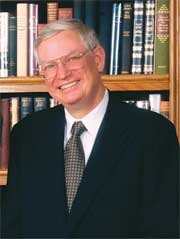By Robert C. Baron
Publisher – Fulcrum Books
 No body reads anymore.
No body reads anymore.
I need financial help in order to stay in business.
While those statements could be made at any time, they actually were written in 1745 by George Faulkner, a Dublin printer and bookseller. He pointed out that a significant number of people in Ireland couldn't read, some, including tradesman and curates, shouldn't read, and the higher classes were too busy to read.
In this wonderfully entertaining appeal to the nobility and gentry of Ireland's largest city, he asked for funds. It is worth pointing out that Faulkner was the publisher of Jonathan Swift, Alexander Pope, Samuel Richardson and Dr. Johnson and had great influence. We sent out a copy of his petition as our 1993 Christmas gift.
For the following 250 years, some so-called “experts” have predicted the demise of the book. First it was radio that threatened the book, then movies, then television. Now it is electronics that seem to be the threat. But is it?
I would like to say a few words about books, what they are, why books are important and how they differ from newspapers, magazines, television and blogs.
The issue is frequently stated as electronics communication versus paper. I suggest that the issue is really superficial versus depth.
We use our I-phones and computers to look for information of a temporary nature. Examples would include airline cost and flight information, choice of and directions to a restaurant, a phone number, the price of a stock, sending or receiving e-mails, gathering data, etc. Twitter, face book pages and blogs are short pieces, often of inconsequential importance. While there is almost an infinite amount of data on the Web, some accurate, much not, our attention span is low, usually clicking on another site in seconds or at the most in a few minutes. There are hundreds of millions of sites out there; your goal is not to get bogged down in trivia. If there are a million hits, you might look at a dozen. News stories are presented for the last 15 minutes and then they disappear into the void. What happened an hour ago or a month ago doesn’t matter. Or does it?
I contrast that with subjects that are in depth. Examples would include sitting down with someone for a long discussion, taking a college course, seeing some movies which cause you to think, e.g. The King's Speech, attending a Denver Forum program, or reading a book. Here the intention is to take sufficient time to be entertained, educated, and in some cases, changed. Here we measure attention span in hours, days or even months.
We need some of both activities. But we should not confuse them. Either can be provided electronically or on paper. One provides data of a very temporary nature; the other can provide information and even personal meaning.
If you put the word Wilderness in your computer, you get 106 million hits. Try Conservation and you’ll end up with 240 million hits. Which of them matter? Will you ever find them?
If you want to understand wilderness, I would suggest that you read books, e.g. Henry David Thoreau’s Walden published in 1854, John Muir’s The Mountains of California, published in 1894, Aldo Leopold’s A Sand County Almanac 1949, Edward Abbey’s Desert Solitaire 1968, or Ian McCallum’s Ecological Intelligence 2005. Or go spend a week in nature. This is reality and the path to wisdom. It takes time and effort to learn. You really don't grow by reading fortune cookie messages.
On a personal level, if you are want to be a writer, write. Write every day or at least every week just as a painter should paint or a musician should play an instrument or sing frequently. You do it for your own reasons, it is your craft. Use your creative talent whatever it is.
Read good writers and learn from them. The English language is a rich gift, as can be seen by reading the King James Bible, Shakespeare, Alexander Pope, TS Eliot, or EB White. Books can bring excitement and adventure to your life.
While we all are important in the eyes of God, not everyone's opinion, experience, imagination, or knowledge is equal. You notice this at a Cocktail Party or looking at Face Book or blogs, or overhearing someone talking on their cell phone. There are differences between people, and between chatter and information.
Some writing as some art is more important and longer lasting than others. Book publishers and their editors do prescreening, finding people with a vision, something to say and the ability to say it well. Then we assign editors, designers, marketing people and printers to present the information or story in a meaningful manner.
Do all books do that? Of course not! There is a difference between the Denver Phone Book or a personal story and War and Peace or the experiences of some celebrity de jour and a Pulitzer Prize winning historian. Many books disappear in a very short time. Some books, a few books, are written in a manner that shines through the decades or centuries.
Books are special because they are an individual act. Each book is different. There is no economy of scale. I can't get one hundred people to write The Great Gatsby or Catch 22 or Huck Finn over the weekend. One person writes a book and books are read by one person at a time in a partnership. This linkage of individuals over time and space is what has always makes books special, as one person touches the mind and heart of another.
A book is important whether you read it on vellum, paper or on a screen. I have books in my library that are three centuries old. I can read them and learn from another human being from far away or long ago. I can share an evening with Plato, Cicero, Shakespeare, Dickens, Mark Twain, James Joyce, John Steinbeck Winston Churchill, David McCullough, or hundreds of other writers.
At Fulcrum we are an author centered house and publish books that matter. We work with good authors and have published more than one thousand books in our 26 years. Some of those and some we have yet to publish will be read and enjoyed long after George and I have gone to that great ballpark in the sky.
Let me make three points.
The first is that education is a life long process. The concept that at age 22 or 28 you have all information and truth and can coast for the rest of your life as a lawyer, doctor, teacher, engineer or whatever is silly although some believe it true and become intellectually lazy. Change is a part of life. Learn to read, think, learn, and communicate in writing and speech. Books can help you to grow. Blogs don’t.
The second point is that there are difference between books and all other media. Newspapers, magazines and television live off advertising and this effects what they produce. As advertising revenues decline, these media often cut back on content. Newsweek or Time are shadows of their former selves. The entire growth in cable has been in distribution and not in creation. You can now watch an old movie, or Mash or I Love Lucy on 20 channels, not one. But, with a few important exceptions, stations are not producing good new programs. The video industry produces little creative material and what it does is generally produced by committees for a least common denominator. They call that market segmentation.
Books have always sold content. Format is secondary. And in a world of increasing noise and data, we need content to make sense of our world and our life.
The third point is the temporary nature of electronic media. Data is stored on disks, first 8 inch, then 5 inch, then 3 inch, then ever smaller. But these disks can not be read by the newer technology or even plugged into the computer. Computer companies come and go. I have written about this in my book Pioneers and Plodders and won’t repeat myself here. When Apple, under Steve Jobs, decided to drop the Apple II E and move to the Macintosh, they did not develop any conversion path. The one million users of Apple IIs and their data were abandoned and their files useless. Software from even the largest companies is not always backward compatible, that is it often can’t read old files. So you can have documents that cannot be read by the current software. Finally all data is stored as 1s and 0s in ever smaller magnetic spots. And in time, some of the magnetic dots and the information behind them disappear.
I can and do read a 200 year old book. I am not able to read a 20 year old storage media or the information it contains. Don't become road kill on the information highway.
Books are permanent, deal with issues of a longer term nature and provide the information to allow you to continue to grow throughout your life.
If you get nothing else out of what I say, remember that education is life long and should not lead to specialization but to generalization. You should know about Shakespeare and Jefferson, about literature and law, about medicine and music, about ancient and modern Greece and China, about religion and science, about the past and the future. You should read books, be exposed to new ideas, different stories, interesting people. You have a whole mind. Don't waste it!
As George Faulkner wrote in 1745, “Buy books- thereby providing support to wretched scribblers, poor printers, struggling publishers and long suffering librarians.”
But most of all, read books for yourself.
Thank you.





